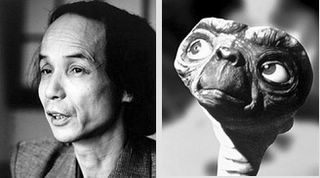The catfood tin tossed into the recycle bin roused me from my sleepy reverie into some sort of movie take on reality.
A truck with a particularly sonorous cargo almost hit me during my walk to work one morning. Rather than be angry or upset, I found myself enchanted with the gamelan-like clang of the pipes in tow.
What kind of spell has this small, "insignificant-looking" (as Stravinsky once called him) man from Japan cast upon me? What net has he cast on me from the other world he now inhabits both in body and spirit?
The wife of Peter Grilli, a close personal friend of Takemitsu's, described her introduction the Composer as "meeting ET."


Takemitsu himself was thrilled at this comparison, because ET apparently was a hero of his. Small, otherworldly, but with a powerful personal magnetism, the fictional character was someone he identified with somehow. I agree, as even from the secondary accounts I've heard and the documentary footage I've seen, I've felt that magnetism. Having had the wonderful opportunity of both hearing some of his works performed live and getting to experience his work in film, I'm left with the feeling of both wonderment and having been cheated. Enriched as we are with his impressive body of work (both for film and the concert stage), how much more so would we be if he were still with us today?
***
Takemitsu described his approach to composition as similar to arranging elements within a Japanese garden - pickup, put down. Pick up, put down. Look at what you have in front of you. Rearrange if necessary. This sensibility is apparent throughout the body of his work - ranging from sentimental Broadway-like themes (Kurosawa's "Dodes'kaden") to his tour de force for biwa, shakahachi and western orchestra, "November Steps."
***
Recently, I treated myself to about the only collection of Takemitsu's film music I know of (outside of the complete works edition available in English sometime next year and imports which may or may not still be in print). It covers a few films I've not seen before (he scored music for 93 films in addition to writing concert music), as well as a couple films I did actually get to see, between what's available from Criterion and that amazing program at the HFA last month. In all, 10 films. Enough to present a decent overview, but only enough to whet one's appetite for his work. Though enamoured of every work on this album, I'd say my favorite two pieces have very strong French influences (Takemitsu was a fan of Messaien and Debussy in particular; he also recounted an episode in his youth of listening to a banned recording of a chanson in a military barracks during WWII as the turning point in his life - he vowed to devote himself to music after that.) The waltz from Teshigahara's "Face of Another", which bears the stamp of both Saint-Saens and Ravel, has been playing in my head for nearly two weeks straight now. Romantic, haunting, compact, it set me on a search for a score and finally the resolve to transcribe what I can so as to be able to bang it out on the piano at home. I need to exorcise this somehow.
His music from "Rikyu" has conflicts between styles - a harsher, more dissonant sound (though not so much as "Woman in the Dunes" - a fine example of musique concrete.) at odds with but also complementing a more serene, almost churchlike modality. Modernity with/against tradition...martial sensibility and priestliness. The more 'churchlike' theme had bothered me for weeks - where did I know it from? Why was it so familiar? Then it hit me: du Caurroy! It was the melody of an old chataigne of a French chanson: "Une Jeune Fillette".
These were only two scores I have looked at in any depth of the ten on the album. Maybe it's my love of French music, maybe it's my love of the vertical in music, but these snippets have contributed to a near obsessive posthumous crush on the little man from Japan who could well be considered one of the greatest composers of the 20th century; who could speak Jazz as easily as Japanese traditional; who strove to unite east and west in his music. Who, before his death, wrote to friends that he "will regain strength as a whale, and swim in the ocean that has no West and no East."


No comments:
Post a Comment